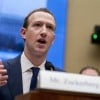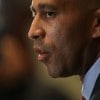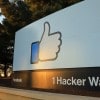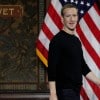Analysis | The Technology 202: Here’s your guide to today’s Capitol Hill hearing featuring Mark Zuckerberg – The Washington Post
Watch Mark Zuckerberg testify live.
Ctrl + N
Facebook chief executive Mark Zuckerberg is back in the hot seat today on Capitol Hill, where he probably will face an icy reception in the Democratic-led House.
Zuckerberg’s appearance in front of the House Financial Services Committee at 10 a.m. this morning comes 18 months after his last time officially before lawmakers, when members grilled him on the company’s privacy practices after the public learned Cambridge Analytica had accessed users’ data without their knowledge. Facebook’s political headaches have only intensified since then, as antitrust, election security and safety concerns loom over the company. Politicians from both parties are increasingly treating the embattled social network as a punching bag.
Zuckerberg’s top priority today is winning lawmakers over as Facebook tries to launch Libra, a digital currency. But the tech guru, who has engaged in a rare media blitz over the last week, knows he’s not necessarily speaking from a position of strength.
“I believe this is something that needs to get built, but I understand we’re not the ideal messenger right now,” Zuckerberg will say, according to his prepared remarks. “We’ve faced a lot of issues over the past few years, and I’m sure people wish it was anyone but Facebook putting this idea forward.”

Facebook CEO Mark Zuckerberg. (Andrew Harnik/AP)
While the hearing is billed as a grilling on the cryptocurrency effort and Facebook’s handling of possible discrimination in housing advertising, lawmakers probably will press Facebook on a host of issues.
Here’s how Zuckerberg has been shaping Facebook’s defenses on five key issues:
1. Libra could bring millions of people into the financial system and help the United States remain competitive with China.
Facebook’s Libra effort faces broad backlash from President Trump and lawmakers from both parties — including House Financial Services Chair Maxine Waters (D-Calif). Zuckerberg promised during a recent Washington trip that the digital currency won’t launch anywhere until U.S. regulators approve it, so the project’s future hinges on his ability to gain their trust.
Zuckerberg’s prepared remarks signal he’ll try to do that by stressing that Libra could address financial inequality by providing a mobile alternative to nearly 14 million people in the United States, which means they could use the financial system from their mobile devices. “The current system is failing them,” Zuckerberg will say. “The financial industry is stagnant and there is no digital financial architecture to support the innovation we need. I believe this problem can be solved, and Libra can help.”
Though the Libra Association, a coalition of Facebook and partners, is based in Switzerland, Zuckerberg will also position Facebook’s push for the digital currency as a way for America to compete with China’s growing cryptocurrency market.
“China is moving quickly to launch similar ideas in the coming months,” he’ll say. “Libra will be backed mostly by dollars and I believe it will extend America’s financial leadership as well as our democratic values and oversight around the world.”
2. The company is taking steps to prevent discrimination in ads and trying to diversify its workforce.
The tech titan will be also be defending the company against concerns that Facebook’s advertising policies allow for housing discrimination. He’ll point to recent changes to ban Facebook advertisers from using age, gender or zip codes to target housing or credit opportunities as part of a settlement with a civil-rights group.
“Our policies have long prohibited discrimination, but we have made significant changes to our ads platform to further prevent advertisers from misusing our tools to discriminate in their ad targeting,” Zuckerberg will say.
Zuckerberg is anticipating lawmakers might also raise concerns about the diversity of the company’s workforce. Zuckerberg will say that Facebook is committed to ensuring at least 50 percent of its workforce is made up of women, people of color and other underrepresented groups in the next five years. . “It took us too long to focus on diversity in a rigorous way and, as a result, the improvements we have made haven’t moved the needle as much as we would like,” he’ll say. “But we are committed to this, and we will to work hard to get to where we know we need to be.”
3. The social network is better prepared to fight foreign interference than it was in the 2016 election.
Facebook earlier this week disclosed it removed four misleading political lad campaigns with ties to Iran and Russia. The announcement comes as Zuckerberg is making a big push to show Facebook has learned from its missteps in 2016 and improved its ability to detect foreign interference on its platform.
Zuckerberg notes in his opening remarks that he has called for government to take a more active role in helping Facebook protect elections.
“Unfortunately, the U.S. did not have a particularly strong response to Russia after 2016,” he said in an interview with my colleague Tony Romm last week, “so it sent the signal to other countries that they could get in on this, too.”
Another key prong of Facebook’s election security message: It has a lot more experience addressing election interference following many elections around the world over the past three years. “We do see today Russia and Iran and China increasingly with more sophisticated tactics are trying to interfere in elections,” Zuckerberg said in an interview with NBC News earlier this week. “But part of why I’m confident going into 2020 is that we’ve played a role in defending against interference in every major election around the world since 2016, in France, in Germany, in the E.U. overall, in India, in Mexico, in Brazil.”
4. Facebook shoud not be a referee for political speech.
Zuckerberg has been fighting back against criticism from Sen. Elizabeth Warren and former vice president Joe Biden, who say the platform has a responsibility not to amplify political falsehoods. The debate has escalated as 2020 Democrats attack the company for running a Trump campaign ad with misleading information about Biden’s dealings with Ukraine.
Zuckerberg defended the company’s recent announcement that it would not fact check politicians’ ads in the same interview with Tony: “People worry, and I worry deeply, too, about an erosion of truth,” Zuckerberg said. “At the same time, I don’t think people want to live in a world where you can only say things that tech companies decide are 100 percent true. And I think that those tensions are something we have to live with.”
This issue could get heated: Zuckerberg’s recent speech outlining his philosophy on free speech only exacerbated criticism from the 2020 candidates.
5. The company has work to do to protect users’ privacy, and it needs help from regulators.
The elephant in the room will be Facebook’s checkered privacy record. Since Cambridge Analytica, more examples of Facebook mishandling users’ data have emerged. Lawmakers will probably have questions for Facebook about how it has addressed these problems, and why consumers should trust the company with sensitive data related to financial transactions as it aims to launch Libra.
Zuckerberg does not talk about privacy much in his prepared remarks, beyond saying the company has “a lot to do to live up to people’s expectations on issues like privacy and security.” Like election security, he also identified this as an area where governments and regulators should play a greater role.
It will be Zuckerberg’s first congressional testimony since the Federal Trade Commission reached a settlement with Facebook requiring the company to pay $5 billion and promise to improve its privacy practices. Lawmakers have raised concerns the FTC’s penalty was just a slap on the wrist, so you can expect more tough questions on this front.
Lawmakers are also taking steps to make sure they’re more prepared to question Zuckerberg than his last Hill ppearance. Rep. Alexandria Ocasio-Cortez (D-N.Y.) asked Twitter for some help:
BITS, NIBBLES AND BYTES
This video by HireVue explains the tech firm’s artificial intelligence-driven assessments for potential job candidates. (HireVue)
BITS: A hiring company that counts Hilton and Unilever as clients says its software can use artificial intelligence to assess an interviewee’s fit for a job based on how much enthusiasm is signaled by their facial expression or speech. But some AI researchers warn the company’s science, which has been used on more than a million applications from more than 100 employers, may be “digital snake oil,” my colleague Drew Harwell reports.
“It’s a profoundly disturbing development that we have proprietary technology that claims to differentiate between a productive worker and a worker who isn’t fit, based on their facial movements, their tone of voice, their mannerisms,” said Meredith Whittaker, a co-founder of the AI Now Institute, a research center in New York. Lisa Feldman Barrett, a neuroscientist who studies emotion and has researched how AI perceives human expressions, is also “strongly skeptical” that the system understands what it’s seeing, she tells Drew.
The black-box nature of HireVue’s process, which is not independently audited and does not make its scores available to job seekers, has also drawn concerns from lawmakers and job seekers. A law forcing employers to tell job applicants how AI-hiring systems work and get their consent before using it will go into effect on Jan. 1 in Illinois.
HireVue defends its technology as a way to reduce human biases. “Humans are inconsistent by nature,” Nathan Mondragon, HireVue’s chief industrial-organizational psychologist, told Drew. “AI can database what the human processes in an interview, without bias. … And humans are now believing in machine decisions over human feedback.”

New York Attorney General Letitia James speaks during a news conference in New York. A state-level antitrust investigation launched last month into Facebook now has the backing of a bipartisan group of 47 attorneys general, James said Tuesday. (Mary Altaffer/AP)
NIBBLES: Forty-six attorneys general from both parties have joined a New York-led antitrust investigation of Facebook, turning up the heat on the company as it’s facing scrutiny of its power in Washington, my colleague Tony Romm reports.
Before officially announcing their support yesterday, representatives for at least 10 of the attorneys general met in Washington on Monday to discuss legal strategy for the sweeping probe of the social media company’s business practices, Jeff Horwitz, John D. McKinnon and Deepa Seetharaman at the Wall Street Journal report.
The nearly six-hour meeting included staff from the Justice Department and the FTC, which have launched separate investigations in the social media giant. Attendees generally agreed that the probe should consider targeting Facebook’s past acquisitions as well as potential harms to advertisers and consumers, but no direction was agreed on, sources in attendance told the Journal.
“Given Facebook’s nearly unprecedented influence in so many sectors of the economy and political process, this bipartisan coalition of attorneys general is committed to ensuring that Facebook is complying with the law and meeting its obligations,” Virginia Attorney General Mark R. Herring (D), one of the 47 officials participating in the probe, told Tony.

A woman with a smartphone. (iStock)
BYTES: The Federal Trade Commission banned three stalkerware apps in the agency’s first enforcement action against surveillance technology that domestic abusers use to track spouses, exes and other victims. The FTC ordered the apps’ creator Retina-X to delete all data the apps collected.
Stalkerware apps such as those sold by Retina-X bypass manufacturers’ restrictions to surreptitiously collect users’ locations, messages and other sensitive data. Retina-X has argued that the apps — MobileSpy, PhoneSheriff and TeenShield — were designed to monitor mobile devices used by children and employees, not by stalkers and domestic abusers. But the FTC says the company took no steps to prevent misuse.
“Although there may be legitimate reasons to track a phone, these apps were designed to run surreptitiously in the background and are uniquely suited to illegal and dangerous uses,” said Andrew Smith, director of the FTC’s Bureau of Consumer Protection.
The company also failed to adequately secure the information the apps collected, the FTC found. Twice between 2017 and 2018, hackers accessed usernames, passwords, text messages, GPS locations, contacts, and photos from the apps, as Motherboard first reported. Because some of that data belonged to children, the FTC also found Retina-X is in violation of federal law protecting children’s privacy online.
Retina-X stopped offering the apps after a second hack.
PUBLIC CLOUD
— News from the public sector:
Under digital surveillance: how American schools spy on millions of kids
Fueled by fears of school shootings, the market has grown rapidly for technologies that monitor students through official school emails and chats
The Guardian
Business
Defense Secretary Mark Esper recuses himself from massive Pentagon contract, citing son’s employment
Esper’s son is employed with one of the contract’s bidders. Deputy Defense Secretary David Norquist will handle the review going forward.
Aaron Gregg
PRIVATE CLOUD
— News from the private sector:
Neumann to Get Up to $1.7 Billion to Exit WeWork as SoftBank Takes Control
SoftBank has reached a deal to take control of WeWork that would hand co-founder Adam Neumann nearly $1.7 billion and sever most of his ties with the company.
Wall Street Journal
Consumer Tech
Our tech columnist helps identify a HIPAA loophole, explains ApplePay and shares a Firefox upgrade that helps you track the data trackers on your computer.
Geoffrey Fowler
Technology
Google Maps now shows speed traps, potentially raising the ire of law enforcement
The company enabled the reporting mechanism for Android users earlier this year.
Marie C. Baca
Facebook Pledges $1 Billion to Ease Housing Crisis Inflamed by Big Tech
The move, which combines money and land, is the latest effort by technology companies to ease the state’s severe housing shortage.
The New York Times
Lyft Expects to Be Profitable a Year Earlier Than Projected
Ride-hailing company Lyft expects to be profitable on an adjusted earnings basis by the end of 2021, a year ahead of analysts’ forecasts, the company’s founders said at WSJ Tech Live.
Wall Street Journal
#TRENDING
— Tech news generating buzz around the Web:
Cinema’s digital impostors are coming
From Rogue One to Gemini Man, the digital rules are changing.
The Verge
The People Who Really, Really Love Mark Zuckerberg
The Facebook CEO’s recent speech was met with thousands of adoring, over-the-top comments. Who would write them?
The Atlantic
The journalist as influencer: how we sell ourselves on social media
After the summer of Caroline Calloway’s Instagram infamy and Jia Tolentino’s huge book launch, where is the line between author and lifestyle celebrity?
The Guardian
@MENTIONS
- Rob Goldman, vice president of advertising at Facebook, has left the company after seven years.
CHECK-INS
— Today
-
Mark Zuckerberg will testify in front of the House Financial Services Committee in a hearing called “An Examination of Facebook and Its Impact on the Financial Services and Housing Sectors” on Wednesday at 10 a.m.
— Coming up:
-
The Senate Banking Committee will host a hearing to examine data ownership, focusing on exploring implications for data privacy rights and data valuation, on Thursday at 10 a.m.
-
Amazon and Twitter will announce their third-quarter earnings on Thursday.
- The House Energy and Commerce Communications and Technology Subcommittee will hold a hearing entitled “Repurposing the C-Band to Benefit all Americans” on Tuesday, October 29, at 10 a.m.
WIRED IN
Facebook chief executive Mark Zuckerberg talks about how the Iraq War shaped his views on the founding of Facebook.

















